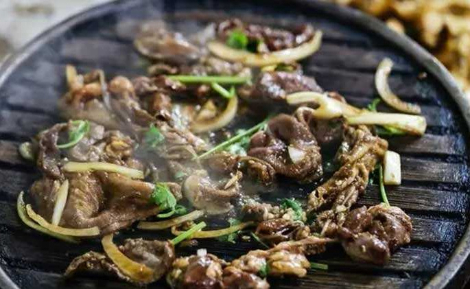烤肉宛品牌怎么样 申请店铺
外推网助力烤肉宛品牌出海!将品牌入驻外推网,定制烤肉宛品牌推广信息,可以显著提高烤肉宛产品曝光,简直是跨境电商爆单神器!目前仅需1000元/年哦~

烤肉宛饭庄开业于清代康熙二十五年(公元1686年),迄今已有300余年历史,主营北京烤牛肉及北京清真风味菜系,是北京建店时间最早、资历最深的老字号之一。烤肉宛初建门脸时,在安儿胡同(现在的绒线胡同)西口,被称为“安儿胡同烤肉”,因店主姓宛,故称烤肉宛。
据资料记载,清康熙二十五年(公元1686年),京东大厂马庄的一宛姓回民到京都谋生,在位于宣武门外下斜街的一家专门批卖酱牛头肉的“锅伙作坊”里干“记帐”差使。锅伙作坊里有二十几位回民摊商常年吃住在这儿,做着推车叫卖牛头肉的生意。宛姓回民记帐之余,看着伙计们每天下午三、四点钟推车出去,亮灯前后回来,时辰不长能挣好几吊钱,心里很是羡慕。心想,卖锅伙作坊货不如自己干。于是辞了“记帐”,干起了推车卖肉的营生。这家作坊牛头肉酱得好,价儿挺便宜,加上地界儿好,小买卖儿不错。宛姓回民每天推车到安儿胡同西口,据说,车摊紧挨着家大酒缸(旧京时专卖酒的小店叫酒缸),那酱好的牛肚、牛板筋这上好的酒菜自然是招了不少人,每天的酱牛头肉天天光。后来,“老宛”见光是批、卖熟肉不过瘾,便打起了添个炭火炙子卖烤肉的主意。“老宛”把自己的想法跟酒缸的掌柜的提出来。那掌柜的看他人勤快也实在,便答应的要求。可卖烤肉得“烟熏火燎”,就限制他得酒缸上门后(打烊)开卖。于是,“老宛”开始了卖炭火烤肉的生意,除了烤肉还卖些发面饼之类的吃食。烤肉宛所在的顺城门大街(现在叫宣武门内大街)是个热闹的地界。往南是有名的琉璃厂,往北是闹市口西单,往西既醇亲王府,南来北往的文人、商客也多。烤肉的生意自然不错。买卖也越做越大,发展到公元1723年至1770年间时,第三代掌柜便在安儿胡同西口路东卖了间铺面房,正式立了字号。据说,当时门面不大,仅备有两张白皮桌,支上烤肉的炙子,由顾客自己选肉、烤肉。有了门脸房,烤肉的生意有了新的发展。到第四代,便在宣武门内现店铺地点,买下官地,盖起几间店堂,变行商为座商,并正式打出“烤肉宛记”的招牌。店堂除经营烤肉外,还增添了芝麻烧饼、包子等主食。这时的烤肉宛已初具规模。不仅平民百姓喜吃这一口,不少社会名流也前来品尝。后来,“烤肉宛记”改为“烤肉宛”,并请清朝末代皇帝溥仪的弟弟——书法家溥杰题写了匾牌。
新中国成立之后至1959年前,烤肉宛的生意平平,三间门脸房经营还算过得去。1959年烤肉宛正式归属当时的西城区服务公司。烤肉宛如坐春风,有了较快的发展。规模不断扩大,添上了清真风味炒菜,从单一烤肉店发展为能经营炒菜的清真饭庄户。生意一直兴旺,销售额呈上升趋势。
进入八十年代,经济体制改革使中国社会发生了很大变化。餐饮业急速发展,市场繁荣。九十年代末期,北京加大城市改造的步伐,烤肉宛同北京的诸多老字号一样,在面临同行竞争的同时,“遭遇”拆迁。烤肉宛成为“颠沛流离”、辗转迁移次数最多的老字号企业之一。久负盛名的烤肉宛多年来一直以良好的经营业绩,成为京城餐饮中的一支奇芭。虽然从京城繁华地区(西单地区)因拆迁移址海淀区,但企业的经营始终没有因拆迁而挫伤,企业的规模不断扩大,已从单店经营发展成为总店、分店,具有较大型规模的餐饮企业。经营状况达到历史最好水平,成为全市的清真餐饮中出类拔萃的企业之一。
烤肉宛饭庄是国家特级餐馆,现在的烤肉宛饭庄有总店、分店两家。总店于2004年10月在西城区南礼士路58号开业,装饰一新的总店建筑面积4000多平方米,可同时容纳800多人就餐。大厅宽敞明亮,雅间豪华典雅,走廊古香古色,别具一格,突出了传统的清真特色。一楼主营烤肉,即传统烤肉、自助烤肉;二、三楼有大中小宴会厅及散座,用于接待团体聚会、宴会包桌等。分店位于海淀区万泉河路69号,经营面积2000多平方米,楼上楼下有雅座8间,宴会大厅明亮、美观是京城旅游小憩之佳地。
2006年,被国家商务部重新认定为“中华老字号”,2006年烤肉宛的烤牛肉制作技艺被认定为北京市非物质文化遗产,2008年烤肉宛的烤牛肉制作技艺被认定为国家级非物质文化遗产。
The restaurant was opened in the 25th year of Kangxi in the Qing Dynasty (1686 AD). It has a history of more than 300 years. It is mainly engaged in Beijing roast beef and Beijing halal flavor cuisine. It is one of the oldest and most experienced time-honored brands in Beijing. When Wanrou was first built, it was called "anerhu barbecue" at the west entrance of an'erhu Lane (now the lint Lane). Because the owner's surname was Wan, it was called Wanrou. According to records, in the 25th year of Kangxi (1686 A.D.) in the Qing Dynasty, the Hui people of Mazhuang, Dachang, Jingdong, came to Kyoto to earn a living, and worked as "bookkeeping" errands in a "pot Gang workshop" specialized in selling sauced beef head meat in Xiaxie street outside Xuanwu Gate. There are more than 20 Hui people's stalls living here all the year round. They sell beef head meat on carts. In addition to keeping accounts, the Hui people, surnamed Wan, are very envious to see the fellows go out at three or four o'clock every afternoon and come back before and after the lights are on. They can earn several coins in a short time. I thought to myself, it's better to sell the pot by myself. So he quit "bookkeeping" and started to sell meat on trolleys. This workshop has a good beef head and meat sauce. The price is very cheap. With good land boundary, the small business is good. The Hui people of the surname Wan push their carts to the west entrance of an'er Hutong every day. It is said that the cart stand is next to the big wine vat (the small liquor store in the old Beijing was called the wine vat). The good wine and vegetables, such as beef tripe with sauce and beef ribs, naturally attract many people. Every day, the sauce beef head is bright. Later, "Lao Wan" saw that it was not enough to batch and sell cooked meat, so he decided to add a charcoal fire to sell barbecue. "Lao Wan" put forward his ideas with the innkeeper of the wine jar. The shopkeeper, seeing that others are diligent and honest, agreed to the request. If he can sell barbecue with "smoke and fire", he will be restricted from selling it when the wine jar comes to his door. So, "Lao Wan" began to sell charcoal barbecue business, in addition to barbecue also sell some pasta and other food. Shunchengmen Street (now called Xuanwumen inner street) where BBQ Wan is located is a bustling boundary. To the south is the famous Liulichang, to the north is Xidan, downtown. To the west is not only the prince's residence, but also many scholars and businessmen from the south to the north. The barbecue business is naturally good. From 1723 to 1770, the third generation of shopkeepers sold a shop in the east of Xikou road in an'er Hutong and officially established a shop name. It is said that at that time, there were only two white tables with barbecued meat on them. The customers could choose their own meat and barbecue. With the concierge, the barbecue business has a new development. In the fourth generation, they bought official land and built several shops in Xuanwumen. They changed the merchants into seat merchants, and officially displayed the sign of "Wanji of barbecue". In addition to the barbecue business, the shop also added sesame pancakes, steamed buns and other staple foods. At this time, the barbecue has begun to take shape. Not only the common people like this, but also many celebrities come to taste it. Later, the record of "barbecue Wan" was changed to "barbecue Wan", and PuJie, the calligrapher, the younger brother of Puyi, the last emperor of the Qing Dynasty, was asked to write a plaque. From the founding of new China to 1959, the business of BBQ Wan was flat, and the operation of three gatehouses was passable. In 1959, BBQ Wan officially belonged to the then Xicheng District Service Company. Barbecue, like sitting in the spring breeze, has developed rapidly. With the continuous expansion of the scale, the halal style stir fry has been added, which has developed from a single barbecue shop to a halal rice producer capable of operating stir fry. Business has been booming and sales are on the rise. In the 1980s, great changes have taken place in Chinese society as a result of the reform of the economic system. The catering industry is developing rapidly and the market is booming. In the late nineties, Beijing increased the pace of urban transformation. Like many old brands in Beijing, BBQ faced the same competition as other brands in the same industry and "suffered" demolition. BBQ Wan has become one of the time-honored enterprises with the largest number of migration. For many years, the well-known barbecue Wan has become a Qiba in the city's catering industry with good business performance. Although Haidian District was relocated from the prosperous area of Beijing (Xidan district) due to demolition, the business operation of the enterprise has not been bruised by demolition, and the scale of the enterprise has been expanding continuously. It has developed from a single store operation to a head store, branch store and a large-scale catering enterprise. The business situation has reached the best level in history, becoming one of the outstanding enterprises in the city's Halal catering. Wanzhou barbecue restaurant is a national super restaurant. Now Wanzhou barbecue restaurant has two main stores and two branches. The head office opened at No. 58, South Lishi Road, Xicheng District in October 2004. The new head office has a building area of more than 4000 square meters and can accommodate more than 800 people at the same time. The hall is spacious and bright, elegant and luxurious, the corridor is antique and unique, highlighting the traditional halal characteristics. The first floor is mainly for barbecue, i.e. traditional barbecue and self-service barbecue; the second and third floors have large and medium-sized banquet halls and scattered seats, which are used for reception of group gatherings, banquet package tables, etc. The branch is located at No. 69, Wanquanhe Road, Haidian District, with a business area of more than 2000 square meters. There are 8 elegant seats upstairs and downstairs. The banquet hall is bright and beautiful, which is a good place for tourism and rest in the capital. In 2006, it was re recognized as the "Chinese time-honored brand" by the Ministry of Commerce of the people's Republic of China. In 2006, the roast beef production technology of roast meat Wan was recognized as the intangible cultural heritage of Beijing. In 2008, the roast beef production technology of roast meat Wan was recognized as the national intangible cultural heritage.
本文链接: https://brand.waitui.com/35a0ce319.html 联系电话:请联系客服添加 联系邮箱:请联系客服添加


















 浙公网安备 33011802001999号
浙公网安备 33011802001999号
